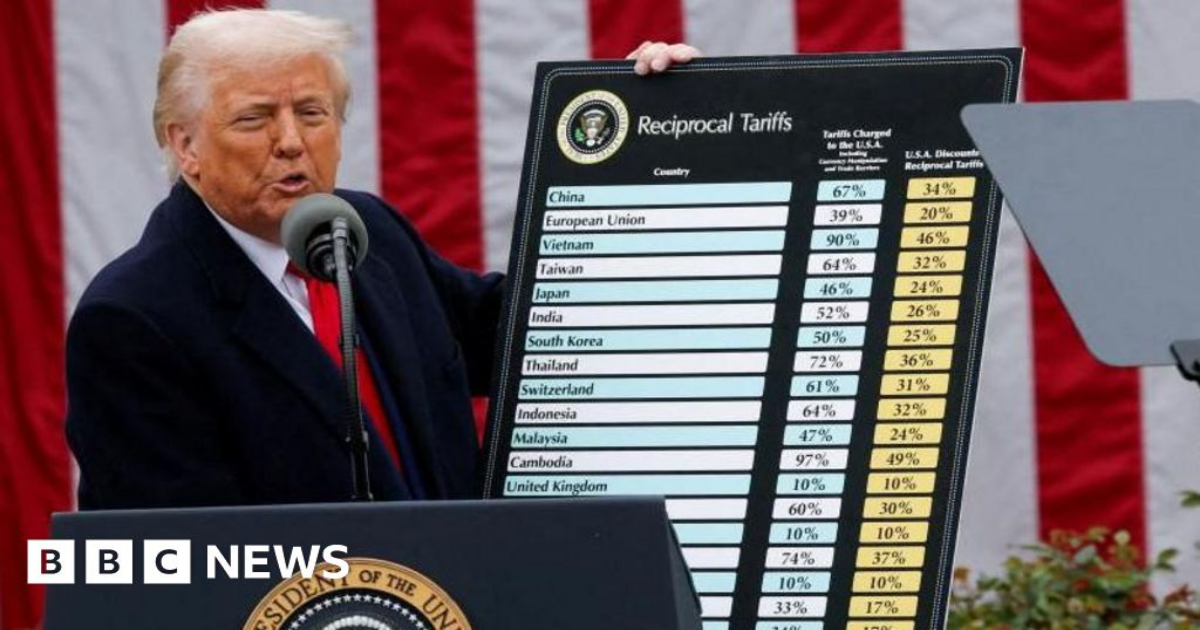US President Donald Trump has imposed tariffs of 50% on all imports from Lesotho, the second highest rate of any country in the world after China.
The tiny southern African country has a large trade surplus with the US, mostly made up of diamonds and textiles, including jeans.
Trump has announced a minimum rate of 10% on all countries’ imports to the US and additional “reciprocal tariffs” for dozens of countries, including 20 in Africa.
Other African countries hit with extra tariffs include 47% for Madagascar, 40% for Mauritius, 37% for Botswana and 30% for South Africa.
Nigerian exports will be hit too – at a rate of 14%.
Kenya, Ghana, Ethiopia, Tanzania, Uganda, Senegal and Liberia were among those countries whose exports to the US will be subject to the baseline tariff of 10%.
Trump said the reciprocal tariffs were “for countries that treat us badly”.
Tariffs are additional taxes charged on goods imported from other countries.
During Wednesday’s announcement at the White House, the Republican president said that the US had been taken advantage of by “cheaters” and had been “pillaged” by foreigners.
“Our taxpayers have been ripped off for more than 50 years, but it is not going to happen any more,” Trump said.
“It’s our declaration of economic independence,” he added while holding up a chart showing a list of countries that charge higher tariffs on US goods, impose “non-tariff” barriers to US trade or have otherwise acted in ways US officials feel undermine American economic goals.
The US is Lesotho’s second biggest trading partner – after South Africa – amounting to around 28% of its total trade in 2022.
According to the White House, in 2024 while the US exported just $2.8m (£2.1m) worth of goods to Lesotho, its imports from the southern African country amounted to $237.3m.
The 50% tariff figure appears to have been reached through US officials looking at the relationship between the trade deficit with Lesotho and the total value of goods imported from Lesotho into the US.
For Lesotho, the extra costs that the tariffs will incur for American buyers could have a big impact as the country’s US trade amounts to more than 10% of its total economy.
Lesotho’s garment factories have made jeans for iconic American brands such as Levi’s and Wrangler in recent years. These exports were done through the African Growth and Opportunity Act (Agoa), which allows eligible African countries to send some goods to the US without having tariffs slapped on them.
Agoa, signed into law by Bill Clinton in 2000, was intended to help African countries grow their economies and create jobs but these tariffs appear to threaten its future.
South Africa is included in the long list of countries dubbed the “worst offenders”, which also involve China, Japan and the European Union – that now face higher US rates – payback for unfair trade policies, Trump said.
According to the list, South Africa charges 60% on US imports – although this is not just tariffs – and in turn, Trump said his country would implement a “discounted” 30% tariff on South Africa – one of Africa’s biggest and most developed economies.
“They have got some bad things going on in South Africa. You know, we are paying them billions of dollars, and we cut the funding because a lot of bad things are happening in South Africa,” he said, before going on to name other countries.
In a statement, the South African presidency condemned the new tariffs as “punitive”, saying they could “serve as a barrier to trade and shared prosperity”.
The White House released a list of roughly 100 countries and the tariff rates that the US would impose on what Trump dubbed “liberation day” for the American people.
Trump added 34% of so-called reciprocal tariffs to existing 20% duties on all Chinese imports to the US, making it the highest rate globally.
In addition, Trump imposed a 25% tariff on all foreign-made automobiles, a move that some analysts say could lead to more vehicles being sent to African countries which rely heavily on imports from Japan, Germany and China.
The US is expected to start charging the 10% tariffs on 5 April, with the higher duties for certain nations starting on 9 April.
African countries like South Africa, Nigeria, and Kenya have long had open trade agreements with the US, and the new tariffs could significantly affect existing economic ties.
The tariffs come as many African countries are already grappling with the effects of US foreign aid cuts, which provided health and humanitarian assistance to vulnerable countries.
Trump announced the aid freeze on his first day in office in January as part of a review into the US government spending.
US-South Africa relations have deteriorated sharply since Trump returned to power.
Trump and his ally, South-Africa born Elon Musk, have singled out South Africa, in particular criticising it over its land reform policies that they say discriminate against white farmers.
Economists say the new tariffs mark a clear departure from the more open trade policies that have previously defined US-Africa relations.
Additional reporting by Damian Zane in London & Basillioh Rukanga in Nairobi
